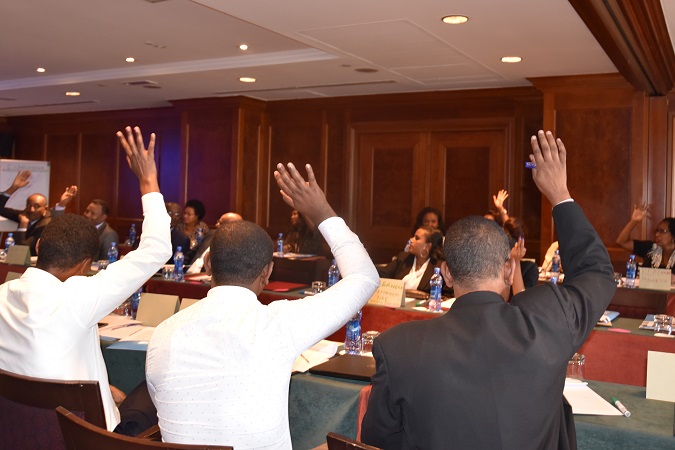BREAKING INTO NEW TERRITORIES: ETHIOPIAN PRIVATE SECTOR COMMITS TO WOMEN EMPOWERMENT PRINCIPLES (WEPs)
Date:

Five companies in Ethiopia namely; Kombolcha Textile Share Company, Enat Bank, United Bank, Oromia International Bank and Vision Fund Micro Finance Institution, have committed to become signatories and promote women empowerment principles (WEPs). This has been a monumental breakthrough for UN Women, as in Ethiopia, the private sector has been very skeptical about affirmative action and promoting gender equality in the work place. The commitment presents motivation for many others who will soon see that promoting women’s empowerment in the work place increases profit margins in business.
Credit goes to the South-South experience sharing with the UN Women Kenya office during a training on Gender and Macroeconomics, and Women Empowerment Principles (WEPs) held from 4-5 April 2019 in Addis Ababa. At this workshop a total of 49 participants (27 Female and 22 male) from government, development and private sector partners were equipped with knowledge and experience on the benefits and the positive impact of gender responsiveness to their profit margins through the WEPs.
Banu Khan, WEE Program Analyst at UN Women Kenya office explained the Women’s Empowerment Principles as a joint initiative of UN Women and UN Global Compact (UNGC), which provides a set of considerations to help the private sector focus on key elements integral to promoting gender equality in the workplace, marketplace and community.
Anna Njoki Amasinde, Manager for Women Banking at the Gulf African Bank (GAB) Limited, which has been successfully implementing the principles mentioned that GAB has embarked on an exciting and innovative journey in partnership with UN Women to open business opportunities for Women-Owned Businesses (WOBs) in their supply chain. According to her GAB seeks to be a leader in promoting supplier diversity and inclusion under the Annisaa (For Women by Women) program.
Judy Mwangi, Head of Corporate Responsibility at Nestle Kenya also explained that in 2013, they signed up to the Women’s Empowerment Principles (WEPs). On their journey of adaptation of WEPs, they designed on going initiatives and discussions around women empowerment - workplace, market place, community. Nestle committed to achieving a gender-balanced workforce by 2018, as a result they have as many women working in senior management roles as men.
Under the UN Women Economic Empowerment Programme, the Ethiopia office intends to continue to follow up with the 5 Private Sector Companies to ensure they roll out the WEPs and the others who committed to work on gender equality become WEPs signatories.